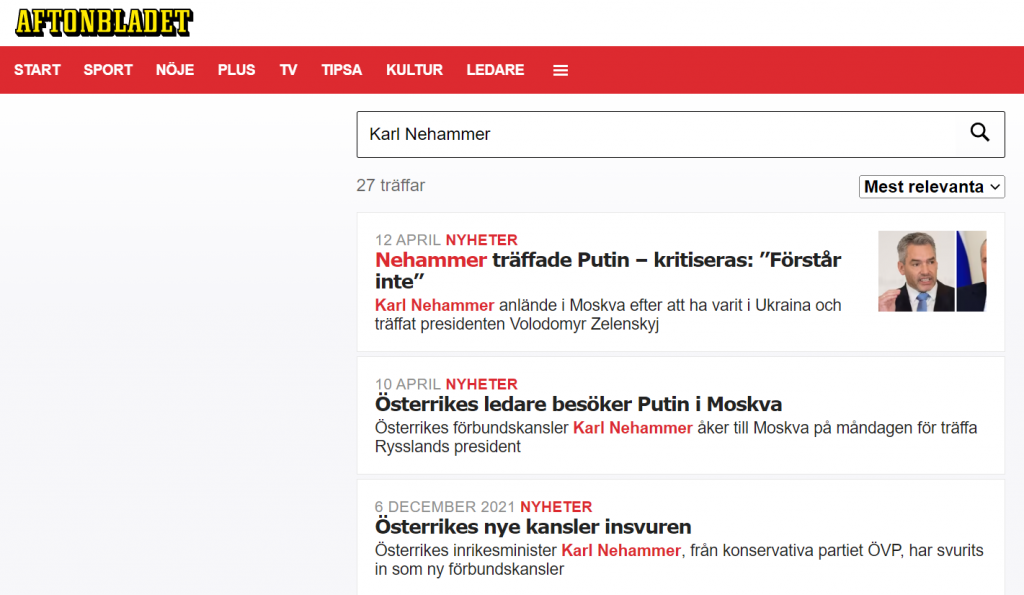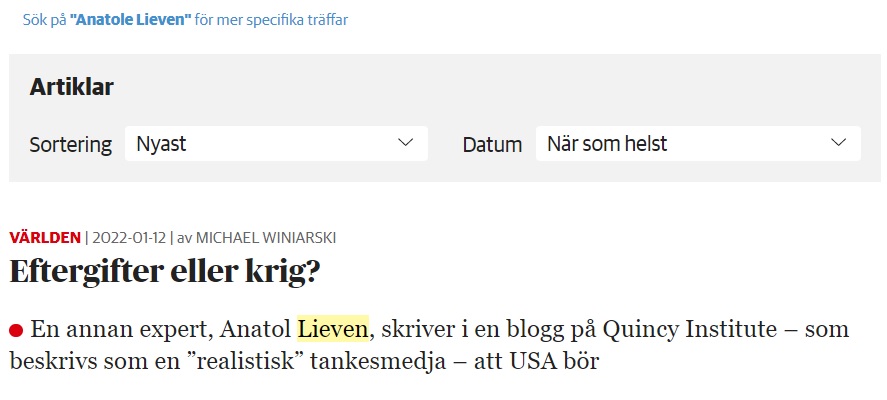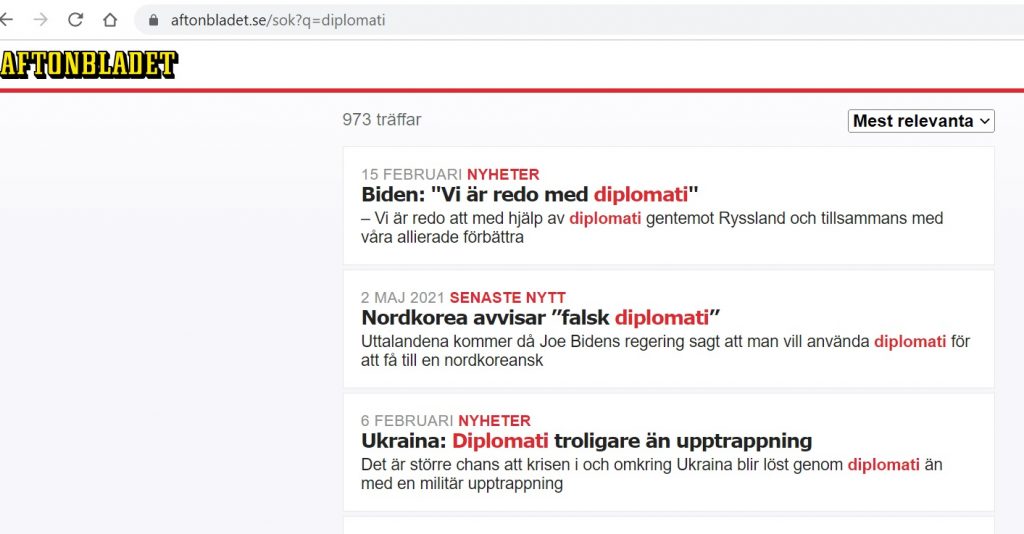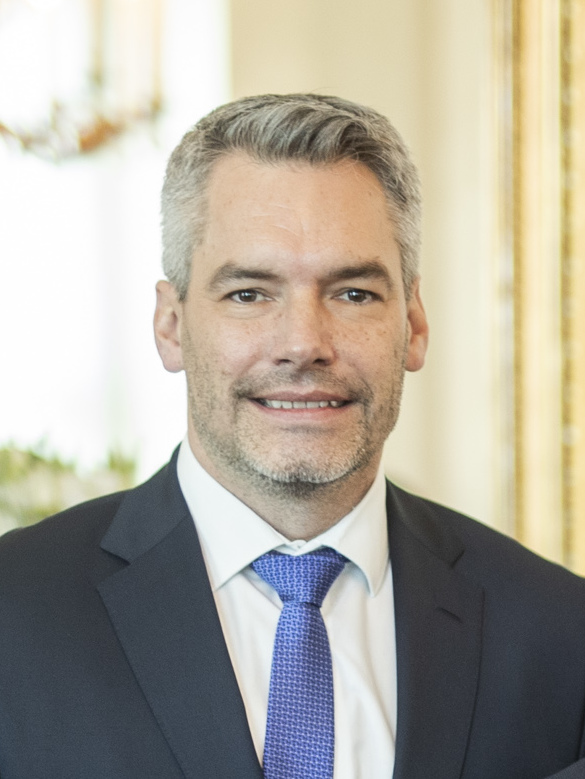Aftonbladet and Karl Nehammer’s Diplomatic Mission to Moscow

By Jonathan Michael Feldman, April 16, 2022; Updated April 25, 2022
Introduction
Putin is engaged in a brutal war against Ukraine. This fact, together with the emotions surrounding that fact as mediated by certain frameworks and personalities, partially explains the displacement of the very idea of diplomacy. In addition, persons who simply advocate diplomatic solutions are maligned, insulted and trivialized as Putin supporters. In contrast, while Russia is responsible for launching the war, some observers note the mistakes or actions by Ukrainians that contributed to the atmosphere of conflict preceeding the war.
The idea of displacement is that something is pushed to the side, marginalized or even buried. One way to displace something is to marginalize a set of ideas, e.g. X, by giving the title of a news story which is the opposite of X (i.e. Y). Another way to displace is to create a journalistic sandwich, i.e. lead with Y, follow with X but marginalize X, and then follow with Y. A third way is to use lots of quotes from those who support Y and leave the X view to a single source. In other words, never find collaborating evidence for X in the broad world of foreign policy or international relations expertise. Finally, one can support Y by “scraping the barrel,” digging deeply for just about anyone, even someone who might be relatively unqualified or less credentialled, and take their viewpoint as authoritative or implicitly useful.
Austrian Chancellor Karl Nehammer recently made a diplomatic trip to Moscow, seeking to promote some diplomatic opening in Ukraine and also to confront Putin’s war crimes. One could argue that Nehammer only represented Austria, but not the EU. Yet, neither the EU nor the US seem interested in diplomatic interventions with Russia which could involve concessions to achieve peace. Austria is a neutral country, outside of NATO, which might give it more diplomatic room for maneuver than a country like Sweden tied to NATO through extensive cooperation. Austria has more room to innovate for diplomacy. Yet, this relative autonomy from both the EU and US approach was condemned by various Eastern European politicians and at least one newspaper seemed more interested in that condemnation then the question of how one promotes diplomacy.
While the possibilities for a peace deal now seem bleak, the probability of a peace deal in the future is diminished by the various ways any opening for peace is trivialized, marginalized, and displaced.
Nehammer’s Belief in Peace
In an interview with CNN reporter Becky Anderson published on Youtube on April 13, 2022, Nehammer discussed his recent meeting with Russian President Vladimir Putin (held after his trip to Moscow on April 11, 2022). Nehammer conveyed to Putin the dangers and horrors of the Russian invasion, but also held out hope for diplomacy. Nehammer stated: “I think we will see that the war will go on. [Putin] was clear in his messages, in his own logic about war. I think that this is very dangerous now…On the other hand, he mentioned the Istanbul peace talks. I think that the Istanbul peace talks could be a chance to stop the war” [emphasis added].
Anderson replied, “Putin said on Tuesday that peace talks with Ukraine had hit a dead end. You’re suggesting that when you spoke to him that you’d still see an opportunity in those talks?” Nehammer replied, “Yeah I think so. And you know I give you now my impression I had because he mentioned the Istanbul peace talks and I informed President Zelensky about that and before I went to Putin I discussed with President Zelensky if it is useful to do this trip. And he said ‘please if you go there, tell him that is now needed to have safe corridors, humanitarian corridors for the people in Mariupol, they don’t have water, no electricity. We have to think about the wounded there.’ So these were also the messages [that] I confronted President Putin [with].” So even Zelensky sanctioned Nehammer’s trip by giving him such instructions.
Anderson brought up the criticism’s of Nehammer’s trip by Ukrainians and Europeans. Nehammer replied “I think it’s useful to go there, to look in his eyes and to say, ‘the war had to end.’ Because you know I think it’s also useful that other Prime Ministers of the European Union talk to him by phone calls, but I think it’s much…stronger first to visit Kiev, to visit Ukraine, to see what is going on there and with these pictures in the mind going to Moscow and confront Putin with these pictures, with what you saw there…The war crimes have to be investigated…and I think it’s much…stronger to look someone in his eyes.”

When it comes to Nehammer’s meeting, Aftonbladet’s journalistic team focused on the criticisms of the trip. A search of Aftonbladet’s articles mentioning Nehammer turns up the following information. One article discussed the trip and a second article criticized the trip. The key information relayed by Nehammer, “I think that the Istanbul peace talks could be a chance to stop the war,” is buried and appears nowhere. Nehammer could be wrong, but the very possibility of diplomatic solutions cannot even be entertained because there was no follow up to the criticism of Nehammer for even going to Ukraine. Perhaps the absence is explained by the fact that Nehammer’s CNN comments came after the Aftonbladet articles were published. Yet, Aftonbladet did not follow up, considering the possibilities for diplomacy un-newsworthy, i.e. another form of displacement is to freeze news reporting to the time period that corresponds to the desired frame. You could say, “well, no matter what new information Nehammer mentioned, Putin is disinterested in diplomacy.” This last argument is a very weak one because it negates other aspects of Aftonbladet reporting (described below) or Zelensky’s interests in Nehammer’s mission.
Ola Palmström, who wrote the Aftonbladet article (April 12th) highlighting the criticisms, explains that Nehammer was “the first European leader to meet Vladimir Putin face to face since the invasion began,” but his trip was criticized “from the Ukrainian side.” He quotes Sergei Orlov, Deputy Mayor of Mariupol, who wrote: “I do not understand how to hold a dialogue with Putin right now.” Palmström uses a CNN report that EU leaders criticized the trip and cites “an anonymous Ukrainian diplomat” who stated that the Austrian Chancellor had “hubris” because “he seriously believes that there is a point in traveling there now that Putin has shown what a brutal war criminal he is.” Orlov also stated, “I do not understand how to have a dialogue with Putin right now, how to do business with him.” In contrast, a previous Aftonbladet article published on April 10th acknowledges that Zelensky was informed of the trip. Yet, in contrast to the CNN interview, we do not learn from Aftonbladet that Zelensky gave Nehammer instructions regarding diplomatic inputs. Again, that information might have been released later, but questions remain as I have argued below. In the quotes from the Nehammer interview above, it is clear that Zelensky himself did not condemn the Nehammer trip (at least that seems to be the impression left by the Austrian leader).
Only after stating the criticisms of the trip, did Palmström’s article explain its larger purpose. Palmström acknowledged how Nehammer “rejected the criticism” he faced, and quoted him as stating that his visit to Moscow was “not a friendly visit.” Palmström quoted Nehammer as stating that his intention was to “do everything to stop the war.” Nehammer was also quoted as stating that for him there was “no other alternative than to try to have direct talks with Russia as well, despite the major differences of opinion.” Palmström brought up Nehammer’s diplomatic purposes late in his article: “During the meeting with Putin, Nehammer emphasized the importance of having functioning humanitarian corridors in order to be able to transport water and food to besieged cities and to be able to evacuate women, children and the injured.” Yet, Palmström’s article quotes Nehammer as downplaying optimism about diplomatic options. The article reads as follows, “the Austrian leader stated that he was not ‘particularly optimistic’ about the future and that ‘the offensive against Ukraine is planned with determination.’”
The Palmström article is structured as follows. Criticize Nehammer for the trip. Mention in brief passing the diplomatic purpose. Quote Nehammer as being not “optimistic” about diplomacy and then conclude with further debunking of diplomacy, i.e. a dystopian sandwich when it comes to diplomacy. Towards the end of the article, Palmström quotes Lithuanian Foreign Minister Gabrielius Landsbergis via CNN, who stated, “Personally, I have no reason to believe that it is possible to talk to him (Putin).” Nothing about Zelensky’s instructions to Nehammer, which perhaps comes out in the CNN interview published after Palmström’s article. One wonders if Aftonbladet could have called the Austrian embassy in Stockholm for further clarifications. Either the Austrians did not return Palmström’s phone call or were never contacted because it is easier to find Eastern Europeans who believe that diplomacy never leads anywhere (or could never lead anywhere) in contrast to Zelensky himself (as evident in his instructions). There was no follow up Aftonbladet article about the potential diplomatic opening identified in the CNN Youtube clip quoted above.
Palmström quotes a diplomat named Jan Lipavský, who he links to Poland, and says Lipavský said “that Nehammer had to be careful.” Lipavský said, “do not be naive. Putin is the perpetrator behind these war crimes and atrocities, and he should be punished for that.” There are several mysteries behind this quote which appears to be yet another bashing of diplomacy and use of a condemnation of Putin to negate diplomacy.

First, Palmström—if I understood his article correctly—labels Jan Lipavský as Poland’s Minister of Foreign Affairs (in Swedish, Palmström wrote: “Personligen har jag ingen anledning att tro att det är möjligt att prata med honom (Putin), sa Litauens utrikesminister Gabrielius Landsbergis enligt CNN. Polens dito, Jan Lipavsky, ansåg att Nehammer måste vara försiktig.”) Yet, Jan Lipavský is the Minister of Foreign Affairs for the Czech Republic, not Poland (with Zbigniew Rau being the Polish Minister of Foreign Affairs). Perhaps this was “an honest mistake” but this mistake suggests that journalists or editors at Aftonbladet are not careful in vetting their articles or processing information.
Second, the populist Czech President, Miloš Zeman, rejected Lipavský “to be the country’s next foreign minister on the grounds of his allegedly poor degree thesis,” according to an article in The Guardian. While this move was “decried as legally baseless by many constitutional scholars,” Zeman still “refused to accept the nomination of Jan Lipavský, citing ‘low qualifications’ and adding that he had only completed a bachelor’s degree, which he said was a lower qualification than those held by all other proposed ministers in the incoming coalition government.” He noted that examiners had awarded Lipavský’s bachelor’s dissertation “the worst possible grade.” Czech Radio confirmed that this thesis got a 3 grade, the lowest. Zeman did appoint “Jan Hamáček as acting foreign minister in the outgoing government, despite Hamáček holding only a high school diploma.” Yet, two wrongs hardly make a right. And even if Zeman is a “populist,” even populists can sometimes tell the truth. In any case, Aftonbladet‘s validation of Lipavský’s expertise, despite his limited education or experience, raises many questions, i.e. about powerful people can be under-educated and wrong. The article ends with Lipavský, the mislabeled and apparently under-qualified foreign minister, having the last word. Sure, persons without advanced university degrees can be good leaders, even wise ones. Yet, the use of this source seems problematic.
Things could be worse, however, when it comes to diplomacy and characterization of Nehammer and his motivations. An article by Joseph P. Chacko in Frontier India (published April 12, 2022) took an even more cynical view of Nehammer’s trip, suggesting that he “tried to blackmail the Russian president by saying that Russia was a butcher to the world media.” Chacko explained that Austria was 80% dependent on Russia for gas supplies, with Baumgarten in Austria being one of the largest gas distribution hubs in Europe.” While Austria served as a Cold War mediator, Chacko cited unnamed analysts who doubted “whether Austria would still be able to function as a bridge-builder today,” adding that “Russians know that the small country no longer has any weight in the EU.” This kind of cynicism involves stringing together a series of facts with little to no evidence of their linkage while simultaneously failing to provide any deep analysis of the diplomatic frontier. The media’s continual use of anonymous sources critical of diplomacy rather than on the record champions of displomacy is tedious and annoying.
The Displacement of Diplomacy and Anatole Lieven: Aftonbladet versus The Nation

In contrast to the diplomacy bashers, Aftonbladet did not contact any experts on Ukraine with an interest in diplomacy such as the London-based Anatol Lieven. Lieven is one of the world’s leading experts addressing the potential diplomatic solutions for Ukraine. He is exactly the kind of expert who should be interviewed by leading Swedish media outlets, but has been ignored. In the an article published in Dagens Nyheter on January 12th this year that mentions Lieven by Michael Winiarski, we find the following idea: Lieven argued “that the United States should support an independent Ukrainian region in the Donbass (controlled by Russian-backed separatists) and a Russian-American agreement on neutrality for Ukraine.” Lieven is described as believing that this choice “would at the same time hold back Russia’s territorial ambitions and Ukraine’s prospects for greater integration with the West.” Winiarski writes that “such an agreement – over the head of Ukraine – is exactly in line with what Russia proposes in the draft agreement: to have an area of influence in Eastern Europe.” Nevertheless Lieven is quoted as asking what the alternative is and asked: “Are you really prepared to consider a war against Russia?” Apparently the answer to that question was yes and Lieven has not been heard from again in the newspaper. Winiarski at least deserves credit for asking important questions in that critical time frame between Putin’s war mobilization and the later, countervailing militarized mobilization involving media, politicians, NATO, and others disinterested in authentic diplomacy.
Since the crisis began, Aftonbladet contacted Lieven only once (in an article focused on the French elections). Some persons in Sweden, even self-proclaimed “democratic socialists,” appear to equate “diplomacy” with support for Putin. This dangerous and emotionally-driven and irrational absurdity is defended by pointing to the obvious atrocities carried out by Putin. It is tedious to remind the reader that diplomacy often involves evil states, that the states condemning Putin (including the United States and Sweden) are involved in their own immoral if not criminal activities, such as arms exports to Yemen or illegal invasions of Iraq and Libya. The counter-refrain is “whataboutism,” which is a kind of bad faith denial of the fact that there are many states that have dirty hands and therefore diplomacy often involves states that have dirty hands.
Where does this lead us? We have a newspaper, Aftonbladet, which purports to be somewhere near the Social Democratic orbit which is indifferent to finding any support for the idea of diplomacy. We have a readership who condones and endorses this viewpoint correctly condemning Putin but leveraging their outrage to displace any hopes of or pressure for diplomacy. We have a leading newspaper that marginalizes the very idea of diplomacy, however remote, and that continues to prevent much proactive thinking and action by burying the idea of diplomacy and by failing to reach out to various experts. Aftonbladet does not have an access problem to global diplomacy experts as there are numerous Swedes with relevant knowledge or recyclable news material in U.S. or British media where diplomatic experts outside Sweden have been quoted. Aftonbladet selectively recycles from CNN, however, raising the question as to why newspapers find diplomacy to be impossible to seriously discuss.

Since the war began on February 24, 2022, Aftonbladet published only one article with the word diplomacy (in Swedish, diplomati) in it. The February 15th article discussed Biden’s being “ready” for diplomacy. Yet, this article did not address how the U.S. was really not engaged in supporting authentic diplomacy (a viewpoint noted by various critical commentators in the U.S. who never appear much if ever in Swedish media these days). A February 6th article in Aftonbladet explained that “diplomacy is more likely than escalation.” When the war came, perhaps the newspaper felt that any articles supporting the idea of diplomacy were irrelevant or out of bounds. Perhaps they believed such articles would be unpopular and would be irrelevant. Yet, I fail to understand this logic. One would think that the more the war continues, the more relevant diplomacy becomes. Yet, diplomacy must involve identifying barriers to diplomacy and these can’t honestly be limited to just what Putin does (no matter how evil and horrific his actions). Zelensky is more interested in diplomacy than Swedish newspapers and many Swedish politicians.
In contrast to the one article in Aftonbladet mentioning Anatole Lieven since January 17, 2006, the left liberal news magazine The Nation in the United States published the following articles since November 15, 2021, with mentions or authorship by Lieven:
- November 15, 2006, “Ukraine: The Most Dangerous Problem in the World,” with the subheading, “but there’s already a solution.”
- January 31, 2022, “Putin, Put’n, and Peace in Ukraine,” with the subheading, “How we can emerge from crisis without war.”
- March 4, 2022, “After Putin: Now is the time to debate and seek to shape the kind of peace we want to see in a post-Putin, post-Trump world.”
- April 7, 2022, “Anatole Lieven on How the Ukraine War Could End.”
- April 11, 2022, “Russia’s War in Ukraine: How It Could End.” A conversation with Anatol Lieven.
Here we see how the a left liberal news outlet in the United States is more interested in diplomatic possibilities that its Swedish equivalent when it comes to the selection of specific experts with extensive knowledge about Ukraine and an interest in diplomacy.
Postscript: Evidence of Failed Diplomacy in Ukraine and Barriers to Diplomacy
There are various sources of information which provide a narrative regarding how diplomacy has been blocked. The breakdown in diplomacy is rooted in different views about the history of the conflict among the leaders of the Ukrainian state, opposing forces to that state in Ukraine itself, and the Russian state. In the Swedish context, I have shown how certain security experts interviewed by the Swedish media selectively deploy information to create a distorting bias. All news sources and individuals have bias. Despite that fact, however, one can compare claims and try to empirically verify them or to identify “sins of omission,” i.e. details, facts or interpretations that are left out. A more general survey by Seda Aksoy in Syre describes war propaganda in Sweden. Various techniques are used to block even thinking or acting proactively on the diplomatic front including “surplus demonization” and “ecological xenophobia” as I have argued previously. The basic strategy is to state a truth A, Putin is demonic, evil and responsible for the invasion of Ukraine. A is certainly true. The problem is that various individuals, some hysterical, or angry or lacking any self-doubt or reflection whatsoever, combine A with anything B that would identify potential Ukrainian contributions to the diplomatic breakdown (prior to the invasion) or analyze how the U.S. or E.U. fail to promote authentic diplomacy, e.g. involving concessions. The very idea of concessions, which the U.S. itself has made in various arms control agreements or disarmament plans, is viewed as a Putin-friendly move or assault on Ukrainian freedom.
Noam Chomsky in a Truthout interview quoting Ambassador Chas Freeman noted the following: “As Freeman [explains], no Russian leader was likely to tolerate the NATO expansion into Ukraine that began after the 2014 ‘coup, [carried out] to prevent neutrality or a pro-Russian government in Kiev, and to replace it with a pro-American government that would bring Ukraine into our sphere…. So, since about 2015 the United States has been arming, training Ukrainians against Russia,’ effectively treating Ukraine ‘as an extension of NATO.’” The last time Aftonbladet cited anything about Noam Chomsky was in October 22, 2021. Of course, this newspaper is not obligated to interview Chomsky, but they are obligated to evaluate how leading intellectuals who disagree with the dominant narrative make their arguments.
Freeman’s interview has been criticized as follows by Gilber Achar: “The interview was conducted by the Russian-propaganda, antivaxx, and conspiracy-theorist Grayzonewebsite.” The only evidence presented here, however, is an article which problematizes vaccine use but can’t easliy be reduced to simply being anti-vaccine. That’s a bit reductionistic. Here is one key passage: “To the extent someone thinks it is wrong for a woman to decline a COVID-19 vaccine because of menstruation-related risks, since the personal and social benefits of getting vaccinated so clearly outweigh (it is argued) such risks – fine, that’s an opinion many people have. But is this to say that it is not necessary to study or warn women about menstruation-related side effects? Because they might, as a consequence, choose to forego Covid-19 vaccination?” I am not suggesting the author of this article in the Grayzone is correct about any claim made. Yet, to debunk a whole website based on a particular reading of one article (and a reading that is somewhat reductionistic by Achar) seems like a form of character assassination. Similarly, I am not debunking the whole of Aftonbladet here. Rather, my key focus was one article, one journalist, and a larger context spilling out to other articles and news outlets. One could argue that raising questions about vaccine use is problematic. Yet, pharmaceutical firms themselves raise such questions. Also, almost any news or academic platform has articles with correct and incorrect information. Debunking a whole platform because of one piece of false information seems weird. The claim “Russia-propaganda” is dropped into Achar’s article without any substantiation. It is thus inuendo. In any case, Achar should refer back to Jacques Ellul who notes that even propaganda contains grains of truth.
Freeman and others, such as Jacques Baud provide detailed evidence of the limits or problems with the dominant narrative about Ukraine. Here is a passage from Baud’s analysis of Ukrainian developments:
“Let’s try to examine the roots of the conflict. It starts with those who for the past eight years have been talking to us about ‘separatists’ or ‘independence’ from the Donbass. It’s wrong. The referendums conducted by the two self-proclaimed republics of Donetsk and Luhansk in May 2014 were not ‘independence’ (независимость) referendums , as some unscrupulous journalists claimed , but ‘self-determination‘ or ‘autonomy‘ (самостоятельность). The term ‘pro-Russian’ suggests that Russia was a party to the conflict, which was not the case, and the term ‘Russian speakers’ would have been more honest. Moreover, these referendums were conducted against the advice of Vladimir Putin.
In fact, these republics did not seek to separate from Ukraine, but to have a statute of autonomy guaranteeing them the use of the Russian language as an official language. Because the first legislative act of the new government resulting from the overthrow of President Yanukovych, was the abolition, on February 23, 2014, of the Kivalov-Kolesnichenko law of 2012 which made Russian an official language. A bit as if putschists decided that French and Italian would no longer be official languages in Switzerland.
This decision causes a storm in the Russian-speaking population. This resulted in fierce repression against the Russian-speaking regions (Odessa, Dnepropetrovsk, Kharkov, Lugansk and Donetsk) which began in February 2014 and led to a militarization of the situation and a few massacres (in Odessa and Mariupol, for the most important). At the end of summer 2014, only the self-proclaimed republics of Donetsk and Lugansk remained.”
